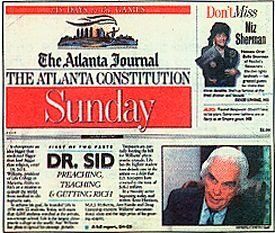When sports chiropractors first appeared at the Olympic Games in the 1980s, it was alongside individual athletes who had experienced the benefits of chiropractic care in their training and recovery processes at home. Fast forward to Paris 2024, where chiropractic care was available in the polyclinic for all athletes, and the attitude has now evolved to recognize that “every athlete deserves access to sports chiropractic."
Dr. Sid and Chiropractic Make the Front Page

"Being in his presence is like sharing a cage with a lion: You admire his strength, but hope he has eaten." Quote from the "LIFE and Times of Dr. Sid Williams," Atlanta Journal-Constitution.
Beginning on the front page of the Dec. 17th Sunday edition of the Atlanta Journal-Constitution, was the first of a two-part series featuring one of chiropractic's most recognizable personalities, Dr. Sid Williams, president/founder of Life College in Marietta, Georgia. Who else in chiropractic but Sid Williams could command six pages of text and photos in a major urban newspaper?
The first part of "The LIFE and Times of Dr. Sid Williams" looks at the dynamic 64-year-old charismatic leader from three perspectives: the roots of his calling, his chiropractic evangilism and his highly successful entrepreneurism. Part II, Dec. 18, examines Life's tax-exempt status and the college's high student loan default rate, along with several general chiropractic topics: the scientific scrutiny of chiropractic; straights vs. mixers; and managed care as a threat to chiropractors.
Part I gives readers an interesting expose on Dr. William's personality, his operating style and his business acumen. We glimpse Dr. William's motivational/evangelic style at one of his three-day "Dynamic Essentials" seminars. Dr. Williams is characterized as a "ubiquitous TV pitchman," (the college spends $650,000 a year on advertising with Ted Turner's TBS), and the seminar attendees adore him. The article dubs him a man "on a mission to convert the world from medical to chiropractic care," whose "motivational rant has the volume and pitch of a mega-church evangelist."
A man "on a mission to convert the world from medical to chiropractic care," whose "motivational rant has the volume and pitch of a mega-church evangelist." Quote from the "LIFE and Times of Dr. Sid Williams," Atlanta Journal-Constitution.
The article brings out Dr. William's vitality, energy and unwavering belief in chiropractic. He's the man with the "penetrating blue eyes that can scare strangers." He's portrayed as overbearing. He's the man who makes the school's major decisions (despite the board's presence). He wants things his way (don't we all), and everything is copacetic as long as others stay the course: "This is a tide-friendly organization," he told the Atlanta reporters. "If you're going with the tide you don't notice resistance ... But if you're going against the tide you feel the resistence."

Some may question that eight of his relatives are on the college payroll, or feel that the three-walled shrine "The Life and Times of Dr. Sid E. Williams" in the college's lobby, and his face personified in the bronze statue of the Cherokee eagle dancer on the gym roof are a little over-the-top, but the guy's a leader: no shrinking violet he.
We read of his "itinerant childhood" and the daily switching from his mother, to his excellent classroom performance, and his staring role as a member of the Georgia Tech football team that won the 1951 Orange Bowl.
And while the Atlanta area readers surely were fascinated by this bigger-than-life man who went from four million in debt in 1960 to founding and building what now is chiropractic's largest college, how do the readers react to the points called into question, particularly in Part II of the article? What will readers think about the chiropractic profession after reading the article?
Part II of the Atlanta Journal-Constitution article on "The LIFE and Times of Dr. Sid Williams" has the subheading, "Student DEBT." We see pictured three former Life students with attached quotes. One graduate owes $55,000 and works in a warehouse. He remembers Dr. Williams telling his class to visualize what their chiropractic practices would look like. The warehouseman comments, "I've tried to visualize my loans being paid off." A second graduate has a practice in Atlanta but has a debt of $30,000; the third student, who never graduated, owes the government around $31,000 and is a free-lance disc jockey.
Is chiropractic a religion?: "We don't have no prophet; we don't have no scripture; we don't have no bible; we don't have no beliefs." Innate? "This is not beliefs. This is knowledge. Ya folla." Quote from the "LIFE and Times of Dr. Sid Williams," Atlanta Journal-Constitution.
The well-known HEAL default rate at Life gets plenty of print in this article. While Life College has gone from 22 students in 1974 to more than 4,000 students today, graduating 500 DCs a year, or 25 percent of all chiropractic graduates, its former students have racked up, according to 1995 HEAL default rates, "$28 million in principal and interest on federally backed loans." Life College is the top ranked defaulter on student HEAL loans of all colleges in the health professions, with a 21 percent rate of default. The 1995 HEAL default rate for the health professions is $330 million in principal and interest, with chiropractic students owing the government around $104 million. Chiropractic students account for 35 percent of defaulted HEAL loans.
Some of the blame must go to Life College for encouraging students to borrow through HEAL, even when the interest on the loans at one point soared to 19 percent. Dr. Williams acknowledges in the article that the federal HEAL program helped the college double its enrollment in the 1980s, but said the government's program was flawed. He's referring here to the government making it harder for chiropractic students to get loans other than HEAL; that chiropractic students had to begin paying their loans sooner after graduation than their medical student counterparts, in fact before they were able to receive licensure.
The article relates that Dr. Williams tells his students, "The sky's the limit," but for the DC HEAL defaulters, the sky has a low cloud cover. A survey of HEAL defaulters showed DCs with the lowest incomes among the health professions. Chiropractors in general, according to 1992 figures, had an average salary $70,000, or fourth place among health professionals. MDs, dentists and optometrists placed 1-2-3, with MDs earning twice as much as DCs.
Given the burden of a large debt incurred by graduation vs. what the new graduates can earn as an associate (the most likely employment for most new DCs), the transition from the safe confines of school to the harsh economic realities of making a living hit home hard for many DCs. It would seem that a few more required business classes early on in their education would be more appropriate than the mandatory 14 quarters of chiropractic philosophy.
"Given the amount of ink spent on HEAL debtors in the article, the average reader no doubt missed the two little paragraphs about today's Life students getting financial aid other than HEAL, and having less than a four percent loan default rate."
The reading public might wonder if Life isn't more concerned about how many graduates get out the door rather than the likelihood of success of those graduates. No one is forcing these students to go to chiropractic college of course, but isn't the problem that it's too easy for too many students to be accepted into the program? But of course chiropractic schools are tuition driven, so what's to be done?
But while the article stresses the HEAL debtors, Life students are no longer getting their loans via HEAL, and in fact haven't since 1990, according to a reliable source. Many students are now opting for financing through a private lender, Education Funding Services. Easing the dependency on HEAL loans was the brain child of the Association of Chiropractic Colleges and its president, Gerard Clum. (See "ChiroLoan Aids Chiropractic Students -- Eliminates HEAL Dependency", May 22, 1992, "DC".) This program stipulated a $80 million financial aid package disbursed over four years.
Given the amount of ink spent on HEAL debtors in the article, the average reader no doubt missed the two little paragraphs about today's Life students getting financial aid other than HEAL, and having less than a four percent default rate.
Still, given the history of student loan default, an obvious question arises: Why has the college tripling the tuition between 1990-95? Students are now shouldering $12,600 a year in tuition and fees, an increase hardly in keeping with the rate of inflation.
Meanwhile life goes on at Life. A $36 million issue of tax exempt bonds has been issued to upgrade the campus and facilities, which will include a video production studio to launch two satellite TV networks. Just recently Dr. Williams cut the ribbon for the $3.9 million expansion of the Sports Health Science facility, and just last year the college completed a state-of-the art track and field facility.
So while there are undeniably some problems in Sid's world, you get the feeling that for Dr. Williams and his Life College, you might have to upgrade "the sky's the limit" to outer space. Or as Life College West President Gerard Clum said of Dr. Williams in the article: "He'll never slow down. He'll be dead for three days and they'll have to beat his heart with a stick to get it to stop." The same might be said for the chiropractic profession.



